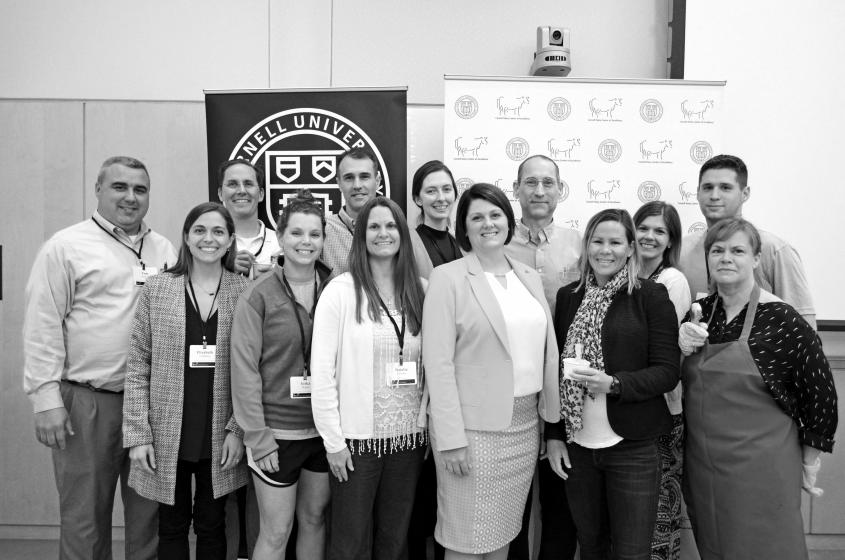The mightiness of milk: Cornell Dairy Center of Excellence hosts second annual symposium

For most of us, milk is our first food, containing everything a growing mammal needs. Those nutritional benefits should be harnessed beyond infancy and into every stage of life, according to the Cornell Dairy Center of Excellence (CDOE), which held its second annual symposium titled “Dairy Nutrition for Every Age and Stage”. The event united everyone from dairy farmers to dieticians—and brought in a ‘Built by Chocolate Milk’ Ironman champion. “The last century has seen dramatic improvement in food safety, and Cornell has been front and center in a lot of those developments,” said Dr. Lorin Warnick, Austin O. Hooey Dean of the College of Veterinary Medicine at Cornell University. “We have a very long legacy in dairy research, and we build on this legacy through the work of faculty across campus who address current issues such as infectious disease, antimicrobial resistance, innovation in food products and more … The Dairy Center of Excellence fosters collaboration amongst our faculty and those outside of the university to address critical needs in dairy research, education and outreach.”

The collaborative nature of the event was clear throughout the symposium, starting with the first session which focused on dairy nutrition through every developmental stage. Speakers discussed the role of dairy in bone development in children, muscle development in adults, and nutrition management in the elderly. The session also featured a talk from Natalie Nicholas ’99, healthcare dining manager and RD for Kendal, a retirement community in Ithaca. “As a dietician, I think milk is the best food source out there, no questions asked … it’s the one food source that has it all,” said Nicholas. “When residents accept dairy into their diet, it makes my job so easy.”
The second session showcased milk production and processing, with presentations on Cornell’s teaching dairy of 150 dairy cows, and a talk from the manager of Spruce Haven Farm, a 2,000 cow dairy that routinely collaborates with Cornell on dairy research. The session also covered the mission and ongoing projects of the Cornell dairy processing plant, which uses 3,500 gallons of milk weekly to fill orders across campus, and explored the complexity of consumer choice in regards to dairy foods, and how science and policy shapes that choice. “The thing that’s been frustrated for dairy farmers and food processors and Joe-regular-consumer are the mixed messages regarding what you should eat and why,” said Andrew Novakovic, professor at the Dyson School of Applied Economics and Management, who went on to explain how the food policies have changed dramatically over the decades, causing shifts in dairy consumption.

The third session focused on dairy’s benefits to the athletic community; Clint Wattenberg ’03, director of sports nutrition for the Ultimate Fighting Championship and former coordinator of sports nutrition for Cornell Athletics, spoke about his partnership with Cornell Dairy, Nutritional Sciences and Athletics to develop a nutrition program for athletes and Big Red Refuel (Cornell’s high protein low fat chocolate milk beverage). “This focus between nutrition, body focus and weight-class sports compelled me to develop really strong relationship around campus and across the professional world,” said Wattenberg. “Cornell Dairy answered the call with what I consider to be the most delicious beverage ever made.”
A highlight of the session was Mirinda Carfrae, an Ironman triathlon world champion and Built with Chocolate Milk athlete, who spoke about how nutrition is just as important as physical and mental strength “When you are training 30 to 35 hours a week, recovery becomes a really important component. The better you recover from a session, the more likely you are to nail the next session,” said Carfrae. “Chocolate milk is my choice of a recovery drink … it tastes good and you’re getting the nutrition you need.”

After much chocolate milk had been drunk and Cornell Dairy ice cream had been eaten, the symposium concluded with fresh collaborative relationships in place. “Success is very dependent on interdisciplinary connections,” said Warnick. “Our hope is that these kinds of events will foster collaboration, and help us in our mission of scientific discovery, our degree programs, and our outreach to industry partners and consumers.”





